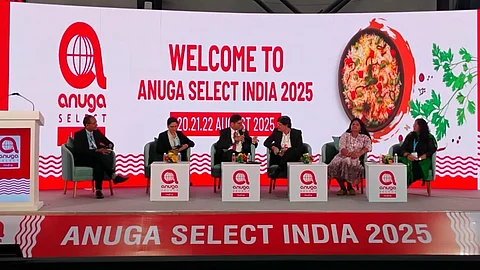
- Home
- EventsEvents
- Product Launches
- CategoriesCategories
- Advertise
- Opinion

At the Bombay Exhibition Centre during Anuga Select India 2025, the Association of Food Scientists and Technologists (India), Mumbai Chapter, hosted a panel discussion titled “The Clean Label Revolution: Transparency in Food Ingredients.”
The session was chaired by Bhushan Namdeorao Yengade, Founder of Binder Technology Consultancy and Joint Secretary of AFST(I) Mumbai Chapter. The discussion brought together leading experts from across the food industry, including Chinmayee Devulgaonkar, Managing Director of FoodChain ID India; Asha Sridhar, CQA at ONE Suhana; Meenu Yadav, Principal Manager – Technical Regulatory Affairs at Marico Ltd; Satish Kolhe, Regional Regulatory Head SAMEA at Givaudan; and Satishkumar Gupta of IRCLASS Systems & Solutions Pvt. Ltd.
The conversation opened with a fundamental question: what does “clean label” really mean? Yengade explained that, for food technologists, it refers to products made with minimally processed ingredients and free from synthetic additives. Devulgaonkar noted that consumers often view it differently, associating clean labels with trust and recognizable ingredients rather than technical definitions.
Innovation in food technology emerged as a key theme. Yadav discussed alternatives to artificial preservatives, while Kolhe highlighted the challenge of maintaining flavor consistency after removing artificial enhancers. He explained that natural modulators are being developed to meet consumer expectations.
On the regulatory side, Sridhar and Gupta underscored the role of FSSAI. Yengade compared India’s approach to global practices, pointing out that the European Union enforces stricter regulations. He emphasized that India will need to align with international standards to strengthen exports and cited a study by Binder Technology Consultancy showing a significant rise in global prices of vegan processed foods.
The panel also explored the link between clean labeling and sustainability. Yadav noted that consumers often associate transparent labeling with eco-friendly practices, while Sridhar added that natural, minimally processed ingredients typically have a lower environmental footprint.
Consumer insights were another focal point. Yengade stressed how social media shapes public perception, with viral content influencing purchasing decisions. Sridhar observed that urban consumers are increasingly willing to pay a premium for natural or preservative-free products, whereas affordability remains a deciding factor in smaller cities.
Yengade predicted that clean labels will shift from niche to mainstream, becoming an industry standard. Both Kolhe and Devulgaonkar described clean label as the future of trust in food, where brands will be expected to demonstrate complete transparency.
The session concluded with a rapid-fire round in which turmeric emerged as the favorite traditional food ingredient. When asked whether consumer demand or regulatory compliance should take priority, the majority agreed that, from a scientific perspective, compliance builds trust and must come first.
The panel reached a clear consensus: the clean label movement in India is not a passing trend but a long-term transformation. Rooted in the country’s traditional knowledge of natural ingredients and driven by rising consumer demand, it is poised to shape the future of India’s food industry.
Click HERE to subscribe to our FREE Weekly Newsletter
